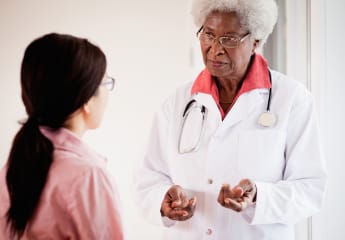What is low blood sugar (hypoglycemia)?

Hypoglycemia means that your blood sugar is low and your body (especially your brain) is not getting enough fuel. If you have diabetes, your blood sugar can go too low if you take too much of some diabetes medicines. It can also go too low if you miss a meal. And it can happen if you exercise too hard without eating enough food. Some medicines used to treat other health problems can cause low blood sugar too.
What are the symptoms?
Symptoms of low blood sugar can start quickly. It may take just 10 to 15 minutes. If you have had diabetes for many years, you may not realize that your blood sugar is low until it drops very low.
- If your blood sugar level drops below 70 (mild low blood sugar), you may feel tired, anxious, dizzy, weak, shaky, or sweaty. You may have a fast heartbeat or blurry vision.
- If your blood sugar level continues to drop, your behavior may change. You may feel more irritable. You may find it hard to concentrate or talk. And you may feel unsteady when you stand or walk. You may become too weak or confused to eat something with sugar to raise your blood sugar level.
- If your blood sugar level drops very low, you may pass out (lose consciousness). Or you may have a seizure or stroke. If you have symptoms of severe low blood sugar, you need to get medical care right away.
If you had a low blood sugar level during the night, you may wake up tired or with a headache. Or you may sweat so much during the night that your pajamas or sheets are damp when you wake up.
How is low blood sugar treated?
You can treat low blood sugar by eating or drinking something that has 15 grams of carbohydrate. These should be quick-sugar foods. Check your blood sugar level again 15 minutes after having a quick-sugar food to make sure your level is getting back to your target range.
Children usually need less than 15 grams of carbohydrate. Check with your doctor or diabetes educator for the amount that is right for your child.
Here are examples of quick-sugar foods that have 15 grams of carbohydrate:
- 3 to 4 glucose tablets
- 1 tablespoon (3 teaspoons) of table sugar
- 1 tablespoon (3 teaspoons) honey
- ½ cup to ¾ cup (4 to 6 ounces) of fruit juice or regular (not diet) soda
- Hard candy (such as 6 Life Savers)
If you have problems with severe low blood sugar, someone else may have to give you glucagon. This is a hormone that raises blood sugar levels quickly.
How can you prevent low blood sugar?
You can take steps to prevent low blood sugar.
- Follow your treatment plan. Take your insulin or other diabetes medicine exactly as your doctor prescribed it. Talk with your doctor if you're having low blood sugar often. Your medicine may need to be adjusted if it's causing your low blood sugar.
- Check your blood sugar levels often. This helps you find early changes before an emergency happens. If you can, use a continuous glucose monitor (CGM) to check your blood sugar. A CGM is constantly reading your blood sugar level, even while you're sleeping. It can tell you if your level is going up or down and how fast.
- Keep a quick-sugar food with you in case your blood sugar level drops low.
- Eat small meals more often so that you don't get too hungry between meals. Don't skip meals.
- Balance extra exercise with eating more. Check your blood sugar and learn how it changes after exercise. If your blood sugar stays at a normal level, you may not need to eat after you exercise.
- Limit how much alcohol you drink. Alcohol can make low blood sugar go even lower. Don't drink alcohol if you have problems recognizing the early signs of low blood sugar.
- Keep a journal of your symptoms. This helps you learn when changes in your body may signal low blood sugar. And keep track of how often you have low blood sugar, including when you last ate and what you ate. This will help you learn what causes your blood sugar to drop.
- Learn about diabetes and low blood sugar. Support groups or a diabetes education center can help you understand how medicines, diet, and exercise affect your blood sugar levels.
Since low blood sugar levels can quickly become an emergency, be sure to wear medical alert jewelry, such as a medical alert bracelet. This is to let people know you have diabetes so they can get help for you. You can buy this at most drugstores. And make sure your family, friends, and coworkers know the symptoms of low blood sugar. Teach them what to do to get your sugar level up.
Follow-up care is a key part of your treatment and safety. Be sure to make and go to all appointments, and contact your doctor if you are having problems. It's also a good idea to know your test results and keep a list of the medicines you take.
Where can you learn more?
Go to http://www.healthwise.net/patientEd
Enter T511 in the search box to learn more about "Learning About Low Blood Sugar (Hypoglycemia) in Diabetes".
Current as of: July 7, 2025
Author: Ignite Healthwise, LLC Staff
Clinical Review Board
All Ignite Healthwise, LLC education is reviewed by a team that includes physicians, nurses, advanced practitioners, registered dieticians, and other healthcare professionals.

